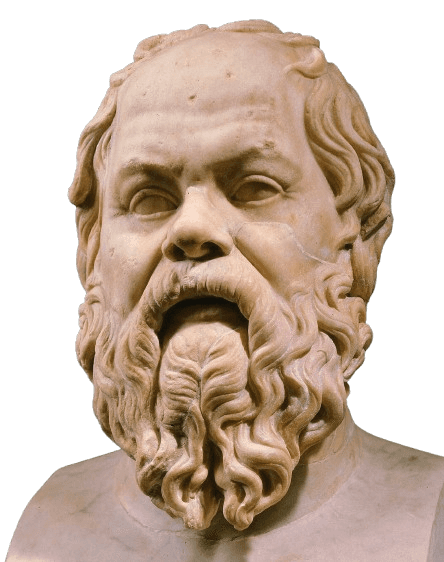Life and achievements
Early life
Socrates was born in 469/470 BC in the deme of Alopece in the city-state of Athens to Sophroniscus, a stonemason, and Phaenarete, a midwife. The environment where he was raised in Athens was rich in cultural and intellectual life, which would play a role in his future philosophical development. Socrates' early education was like any other young male from an upper-middle-class family in Athens; he learned to read and write and was also introduced to the arts. He also had lessons in gymnastics, poetry, and music, all of which were important in the eyes of the Athenians.
Socrates' father was a stoneworker and learned this trade while still young. However, his most significant interest was to study and engage in the intellectual process of philosophy. He spent most of his time in dialogues with the people of Athens, challenging their opinions and making them reconsider their existence and the world around them. He had a way of asking questions, now referred to as the Socratic Method, where he would ask questions to make his opponents contradict themselves and make them think.
Socrates' experience in the war during the Peloponnesian War also influenced his personality and the way he thought. He fought in many battles and showed his bravery and endurance many times. Even though Socrates actively participated in the military of Athens, he did not deviate from his philosophical path, which was, in most cases, contrary to Athens's political and social structure. Plato's early life can be described in terms of his education, military service, and interaction with the people of Athens; these shaped his future philosophical work and his influence on the Western world.
Legacy
The teachings of Socrates have a significant impact on his followers and the further development of Western philosophy. His teaching method, the Socratic Method, is still used today in philosophy and education and involves questions and discussions to conclude. Thus, Socrates' focus on ethics and the analysis of the life of people prepared the ground for further philosophical investigations of morality, the concept of virtue, and the idea of the good life.
Socrates's biographies and teachings are documented by his students, Plato and Xenophon, and passed down for future generations to learn from. Socratic philosophy is mainly represented by Plato's dialogues, where Socrates is depicted as a man who seeks the truth and provokes people to think critically. These works have influenced many philosophers, scholars, and educators and thus cemented Socrates' position as one of the most influential figures in the history of Western philosophy.
Socrates' impact was not confined to the Socratic school and its disciples; it also affected subsequent philosophical currents such as stoicism, cynicism, and academic scepticism. His views on the examined life, the nature of knowledge, and virtue remained influential in the ancient world and are still discussed in philosophy today. The existence of Socrates in the arts, literature, and media also shows that he is remembered as a philosopher and a thinker who questioned the world.
Socrates faced many difficulties and finally was condemned to death for his ideas, but his devotion to the principles and the way of the discussion influenced the further development of humanity's philosophical thought. He left behind an essential lesson that philosophy and the process of questioning and introspection are relevant even in the modern world.
Milestone moments
Oct 30, 470
Socrates, the famous philosopher, is born.
Socrates was born in 470 BC in the deme of Alopece in Athens to Sophroniscus, a stonemason, and Phaenarete, a midwife. He was born into a reasonably wealthy family in Athens, which enabled him to receive the education and means he needed for his future philosophical activities—this period signified the start of a lifelong process of critical thinking, conversation, and learning.
Oct 22, 432
Military service at the battle of Potidaea in 432 BC.
Socrates was a warrior in the Peloponnesian War and fought gallantly in the Battle of Potidaea. His courage in battle was also acknowledged by his peers, including his student Plato. Socrates was a man who served in the military. Still, he never let his military obligations deter him from his philosophical discussions, which he could have even during a war. He also learned about courage, duty, and the examined life from his military experiences.
Oct 23, 423
In 423 BC: Representation in Aristophanes' The Clouds.
Socrates was depicted in the play The Clouds by Aristophanes, a famous comic writer. Thus, Socrates was shown as a sophist and immoral influence on the young people, which underlined the conflict between his philosophical work and the society of Athens. It played a role in creating Socrates' image and his being considered a provocative character in Athens. It also gave the impression of the accusations that would later be levelled against him, culminating in his trial and death.
Oct 22, 399
Trial and Sentencing
Socrates was put to trial in 399 BC and was convicted and sentenced to death for the charges of corruption of the young and impiety. The trial, which was recorded by his students Plato and Xenophon, depicted Socrates' adherence to his principles and his way of reasoning. Although he had a chance to flee, Socrates accepted the death penalty, stating that he had to obey the state's laws. His trial and execution became one of the most significant events in his life and career, showing his commitment to truth and justice.
